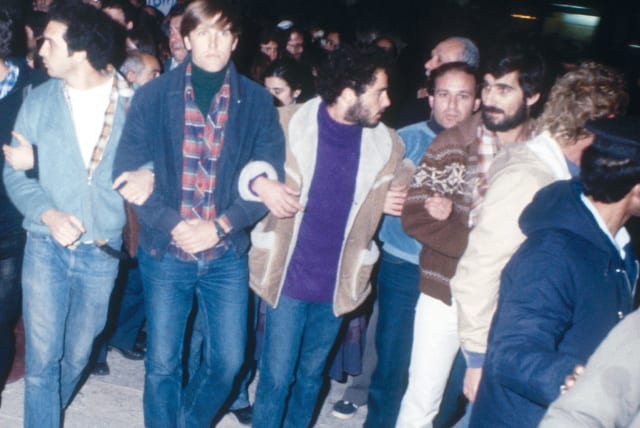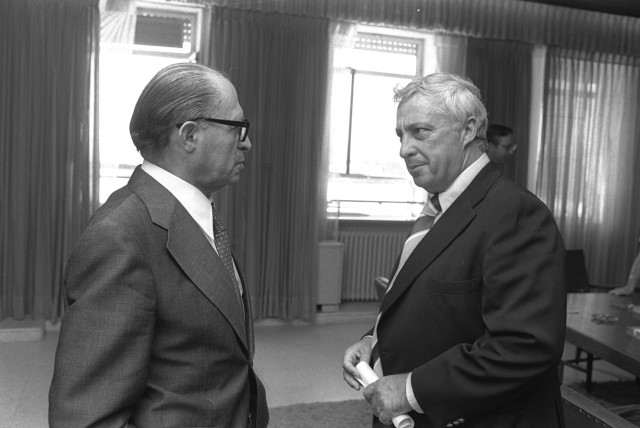Israeli political polarization: Judicial reform vs. 1982 Lebanon War - opinion

Without minimizing this year’s tensions, given the events surrounding the First Lebanon War, is the current political polarization really “unprecedented?”
The acrimonious debate over the Netanyahu government’s judicial reform package has had more than one commentator warn of “unprecedented” domestic polarization.
Yet this characterization is questionable, stemming perhaps more from nostalgia about Israel’s past than from serious historical scrutiny. Seemingly forgotten is the intense political animus accompanying the First Lebanon War, which erupted 41 years ago this month.
I immigrated to Israel in March 1982, and within three months of my arrival the IDF was fighting Operation Peace for Galilee, launched on June 6 following barrages of Palestinian Katyusha rockets fired from southern Lebanon into Israel.
Prime minister Menachem Begin declared that the goal of the operation was to safeguard the civilian population of northern Israel by removing the PLO’s military machine from an area of Lebanon 40 km. from the border – the purported range of its rockets.
The First Lebanon War: An event that divided and polarized Israel
The operation initially enjoyed strong bipartisan support, with the Labor opposition backing the Likud government’s decision to go to war. But cracks in the political consensus would emerge as the IDF raced northward beyond the espoused 40 km.
In truth, the government’s aims in Lebanon were more expansive than those first publicly articulated. Begin, and his defense minister Ariel Sharon, did not just seek to end the PLO’s presence in southern Lebanon; they sought to dismantle the Palestinians’ “state within a state” in its entirety, roll back Syria’s occupation, and help Israel’s Christian Phalangist allies come to power. The end goal was to see the creation of a stable, pro-Western Lebanon that would sign a peace treaty with Israel.
Achieving these larger objectives necessitated fighting the Syrians as well as the Palestinians, and for the IDF to reach the outskirts of Beirut – from where it could both threaten the PLO’s center of operations and influence Lebanon’s political future.
As it became apparent that Israel was not conducting a limited defensive operation, and casualties among Israeli soldiers spiraled, public dissatisfaction with the war intensified.
For a growing number of critics, Israel had mistakenly entered the Lebanese quagmire, sucked into that country’s unending internecine conflicts. Begin and Sharon were accused of strategic overreach, embarking upon an “Israeli Vietnam” where victory would remain elusive.
Opposition to the war manifested itself not just in growing protests, but in the figure of Col. Eli Geva, the commander of an armored brigade who refused to lead his troops in the siege of Beirut.
Geva feared for the lives of his own men in the anticipated street-to-street fighting, as well as for the civilian population of the Lebanese capital. Not wishing to be seen as deserting his troops, Geva offered to command a single tank into battle. He was ultimately dismissed from the IDF for failing to honor the chain of command.
DISSENT NOTWITHSTANDING, in August 1982 it looked as if Israel’s goals were close to being realized. Under intense IDF pressure, Yasser Arafat and thousands of his PLO fighters were forced to exit Beirut – an international agreement guaranteed their safe departure for countries far afield. It was indeed the end of the PLO’s independent Lebanese mini-state.
And that same month, Phalangist leader Bashir Gemayel was elected Lebanon’s president, raising hopes in Jerusalem for an imminent peace treaty (though Gemayel told Begin that the political realities demanded going slow on normalization).
But any optimism was expeditiously replaced by despondency. Within three weeks of Gemayel’s election, Syrian president Hafez Assad had him assassinated. The Phalange headquarters in eastern Beirut was bombed on September 14, killing the president-elect and 26 others.
That blow was followed by a catastrophe. Between September 16 and 18, Israel’s Phalangist allies conducted a revenge massacre in Beirut’s Palestinian refugee camps of Sabra and Shatila. The exact death toll continues to be contested, ranging from 460 to 3,500.
That slaughter of civilians energized Israel’s anti-war protesters and brought about what was then described as the largest-ever demonstration in the country’s history.
The media reported that 400,000 protesters (clearly an exaggeration) gathered in Tel Aviv’s Malachei Yisrael Square (today Rabin Square) to demand the establishment of a judicial commission of inquiry into Israel’s role in the massacre. It was also my first demonstration as an Israeli citizen.
Begin was initially dismissive of this call, writing “that Arabs murdered Arabs” and Israel was getting the blame. But as domestic and international pressure intensified, the prime minister agreed to an independent judicial investigation chaired by the president of the Supreme Court, Yitzhak Kahan.
Following a four-month effort, on February 8, 1983, the Kahan Commission issued its findings: “The decision on the entry of the Phalangists into the refugee camps was taken without consideration of the danger… that the Phalangists would commit massacres and pogroms against the inhabitants of the camps.”
As to Sharon’s role, the commission ruled he bore “personal responsibility” in “ignoring the danger of bloodshed and revenge,” and for “not taking appropriate measures” to prevent the carnage. It called for the defense minister’s ouster.
On February 10, 1983, while the government debated Kahan’s recommendations, protesters assembled outside the Prime Minister’s Office demanding Sharon’s dismissal.
Yonah Avrushmi, a petty criminal prone to extremism, lobbed a grenade into a group of anti-war protesters, killing Peace Now activist Emil Grunzweig and injuring nine others – among them future Knesset speaker Avraham Burg (Labor) and government minister Yuval Steinitz (Likud).
Grunzweig’s death was the murderous climax in a protracted, bitter, impassioned and highly polarized political schism.
One camp saw the war as unnecessary, irresponsible, and fraudulent, holding Begin and Sharon accountable for the ever-mounting Israeli casualties (military fatalities were to reach 654 by the time of the IDF’s 1985 withdrawal).
On the other side, peace protesters were accused of giving succor to the enemy, and in so doing, displaying gross disloyalty while Israel’s soldiers were fighting a war.
If Peace Now demonstrators chanted “murderers,” right-wing activists shouted “traitors,” and the psychologically disturbed Avrushmi believed he knew how to deal with those he saw as stabbing Israel in the back.
FAST FORWARD to today: The rancorous debate over judicial reform has involved ongoing mass protests, predictions of declining foreign investment, reservists threatening to cease serving, and the repeated use of pejoratives like “fascist” and “anarchist.”
But so far, violence has been limited and, thankfully, no one has been killed – and let’s hope it stays that way.
Without minimizing this year’s tensions, given the events surrounding the First Lebanon War, is the current political polarization really “unprecedented?”
The writer, formerly an adviser to the prime minister, is chair of the Abba Eban Institute for Diplomacy at Reichman University. Connect with him on LinkedIn, @Ambassador Mark Regev.
Jerusalem Post Store
`; document.getElementById("linkPremium").innerHTML = cont; var divWithLink = document.getElementById("premium-link"); if (divWithLink !== null && divWithLink !== 'undefined') { divWithLink.style.border = "solid 1px #cb0f3e"; divWithLink.style.textAlign = "center"; divWithLink.style.marginBottom = "15px"; divWithLink.style.marginTop = "15px"; divWithLink.style.width = "100%"; divWithLink.style.backgroundColor = "#122952"; divWithLink.style.color = "#ffffff"; divWithLink.style.lineHeight = "1.5"; } } (function (v, i) { });

